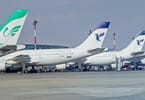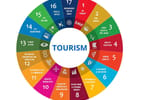As Americans prepare to pay extra for checked bags, wait in long lines, and endure crowded commercial flights this summer, super-wealthy private jet owners are enjoying tax breaks and luxury at the public’s expense. “High Flyers: How Private Jet Travel Is Straining the System, Warming the Planet, and Costing You Money,” a new report from the Institute for Policy Studies and Essential Action, exposes the impacts of private aviation on the air traffic system, carbon emissions, and everyday travelers.
“While air travel has become more expensive, uncomfortable and degrading for the rest of us, a growing class of ultra-rich Americans are fueling a boom in private jets and flying high on tax breaks,” said Chuck Collins, senior scholar at the Institute for Policy Studies and coordinator of the Working Group on Extreme Inequality. “The surge in private jets has real costs to taxpayers, shareholders, and everyday air travelers. These high flyers aren’t just living large on their own privilege, they’re threatening our environment, security, and the cohesion of our country, at our expense.”
According to the report, jointly authored by Collins, Sarah Anderson, and Dedrick Muhammad of the Institute for Policy Studies, and Samuel Bollier and Robert Weissman of Essential Action, the last decade has seen an unprecedented explosion in private jet travel in the United States. Between 2003 and 2007 alone, annual worldwide sales of private jets more than doubled to US$19.4 billion.
“The super-wealthy, private jet-set are shifting the costs of their high-flying indulgence on to the rest of us,” said report co-author Robert Weissman, director of Essential Action. “They pollute more than commercial flight passengers, but don’t pay. They don’t pay a fair share of their air traffic control costs. And they have manipulated the tax code so we all subsidize the cost of private jet purchases.”
According to the report, private jet travelers pay lower taxes and fees than ordinary commercial travelers, even though this elite transport burns five times more carbon than commercial airplanes.
This year, the private jet lobby won another special tax break for purchasers of new aircraft as part of the 2008 Economic Stimulus Act. Experts predict this won’t actually help jumpstart the economy, and could worsen global warming.
Corporate executives form the backbone of the private jet industry’s clientele. “It’s the norm these days for boards of large firms to require CEOs to use private jets for all travel, including personal vacations,” explained report co-author Sarah Anderson, an Institute for Policy Studies fellow. “They claim this is necessary for security reasons, but these perks are just one more example of executive excess.”
Private flyers are not subject to the security rules that apply to commercial travelers, a risk the Department of Homeland Security acknowledges hasn’t been addressed almost seven years after 9/11.
The High Flyers report criticizes government inaction to rein in gas-guzzling, sky-crowding private jets, and the super-wealthy High Flyers who dodge security restrictions, carbon costs, and taxes.
“The rapid expansion in private jet travel has paralleled the growing inequality of income and wealth in our country. In the last twenty years, most of the growth in income and assets has flowed up to the wealthiest one percent of households – and within that, the top one-tenth of one percent,” the report says. “The expansion of private jet travel is symptomatic of these extreme inequalities… Inequalities that need to be remedied if we are to rebuild an economy that works for working Americans.”
The report recommends imposing a “luxury tax” on private jets and fixing the FAA’s funding structure to require private jets to pay their share of costs. The authors call on Congress to tighten security requirements on private jets. The report suggests government subsidies spent on fixing small airports that largely serve private jets would be better invested in high-speed rail as an alternative to short-haul air travel.
WHAT TO TAKE AWAY FROM THIS ARTICLE:
- According to the report, jointly authored by Collins, Sarah Anderson, and Dedrick Muhammad of the Institute for Policy Studies, and Samuel Bollier and Robert Weissman of Essential Action, the last decade has seen an unprecedented explosion in private jet travel in the United States.
- “While air travel has become more expensive, uncomfortable and degrading for the rest of us, a growing class of ultra-rich Americans are fueling a boom in private jets and flying high on tax breaks,”.
- A new report from the Institute for Policy Studies and Essential Action, exposes the impacts of private aviation on the air traffic system, carbon emissions, and everyday travelers.






















